Unit7 Travelling in Garden City 第2课时 语法知识及拓展(课件)(共25张PPT)
文档属性
| 名称 | Unit7 Travelling in Garden City 第2课时 语法知识及拓展(课件)(共25张PPT) | 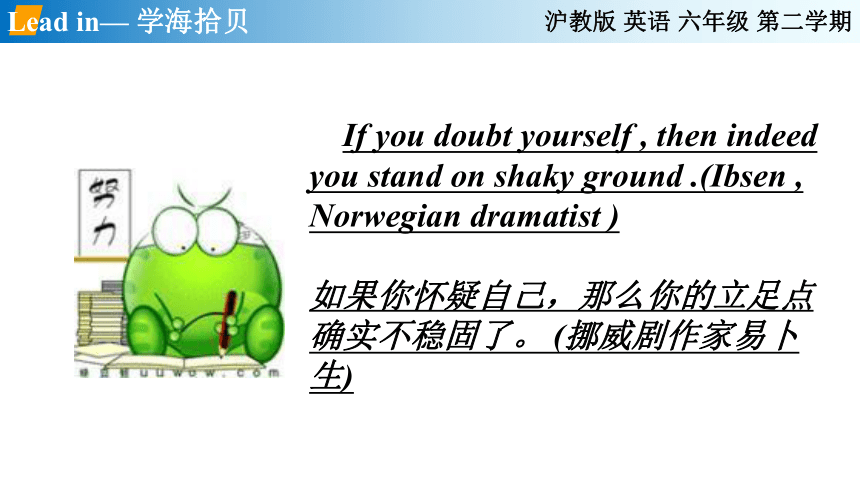 | |
| 格式 | pptx | ||
| 文件大小 | 344.5KB | ||
| 资源类型 | 试卷 | ||
| 版本资源 | 牛津上海版(试用本) | ||
| 科目 | 英语 | ||
| 更新时间 | 2022-05-21 06:48:53 | ||
图片预览

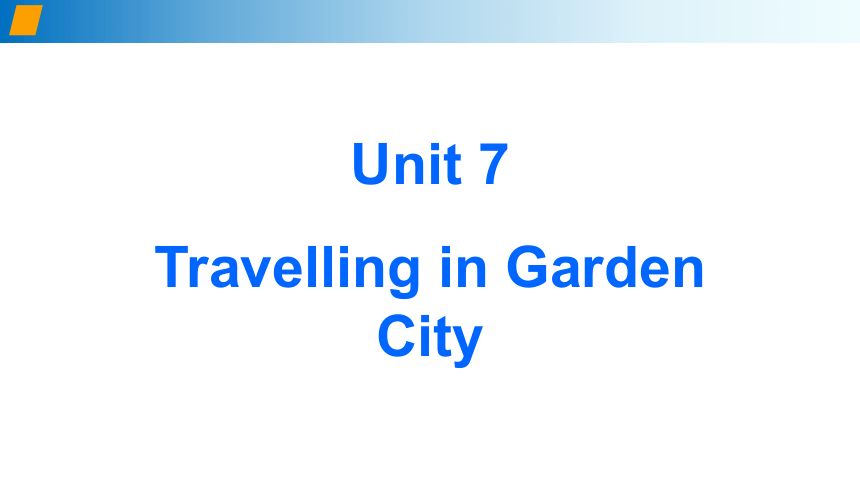

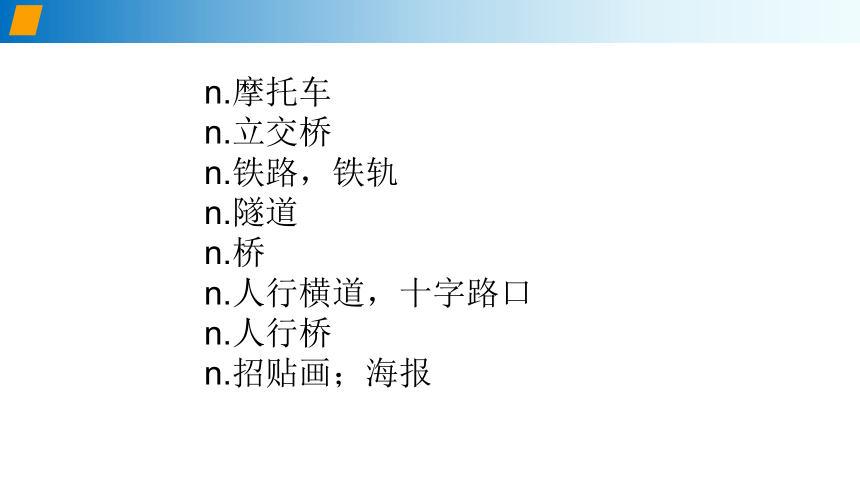
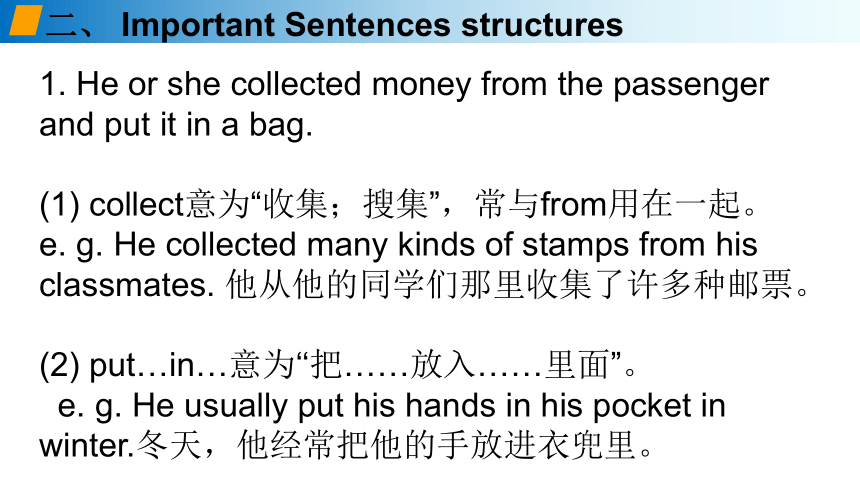
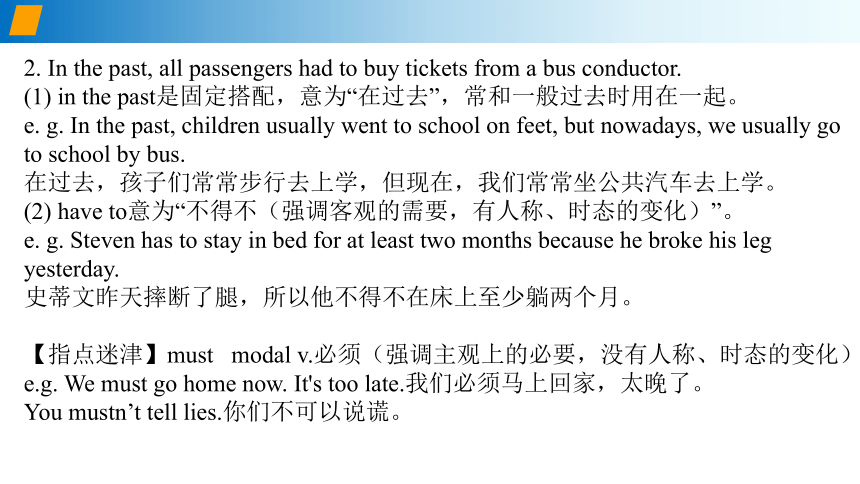


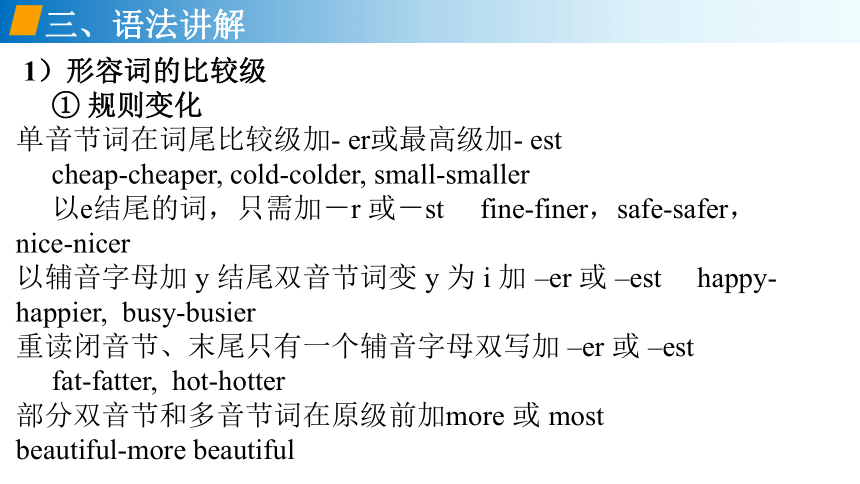
文档简介
(共25张PPT)
Lead in— 学海拾贝
沪教版 英语 六年级 第二学期
If you doubt yourself , then indeed you stand on shaky ground .(Ibsen , Norwegian dramatist )
如果你怀疑自己,那么你的立足点确实不稳固了。 (挪威剧作家易卜生)
Unit 7
Travelling in Garden City
一、知识回顾
1. 单词默写。
n.车费;船费
adj.公众的,公共的
n. 交通;运输
n. 售票员
adv.现在.现今;如今
adv.代替
pron. 大多数
pron.没人;一个也没有;毫无
adv.还是,仍然
adv. 也许;可能;大概
adj.很少,几乎没有
n.交通阻塞
n.摩托车
n.立交桥
n.铁路,铁轨
n.隧道
n.桥
n.人行横道,十字路口
n.人行桥
n.招贴画;海报
二、 Important Sentences structures
1. He or she collected money from the passenger and put it in a bag.
(1) collect意为“收集;搜集”,常与from用在一起。
e. g. He collected many kinds of stamps from his classmates. 他从他的同学们那里收集了许多种邮票。
(2) put…in…意为‘‘把……放入……里面”。
e. g. He usually put his hands in his pocket in winter.冬天,他经常把他的手放进衣兜里。
2. In the past, all passengers had to buy tickets from a bus conductor.
(1) in the past是固定搭配,意为“在过去”,常和一般过去时用在一起。
e. g. In the past, children usually went to school on feet, but nowadays, we usually go to school by bus.
在过去,孩子们常常步行去上学,但现在,我们常常坐公共汽车去上学。
(2) have to意为“不得不(强调客观的需要,有人称、时态的变化)”。
e. g. Steven has to stay in bed for at least two months because he broke his leg yesterday.
史蒂文昨天摔断了腿,所以他不得不在床上至少躺两个月。
【指点迷津】must modal v.必须(强调主观上的必要,没有人称、时态的变化)
e.g. We must go home now. It's too late.我们必须马上回家,太晚了。
You mustn’t tell lies.你们不可以说谎。
3. Nowadays, some of the bus drivers are women, but most of them are still men.
some在这里作代词,意为“一些”。
e. g. -Is there any juice left in the bottle 瓶子里还剩有果汁吗?
-Yes, there's some.是的,还剩下一些。
【知识拓展】some还可作形容词,意为“一些”。
e. g. -Would you like some milk 你要喝点儿牛奶吗?
-Yes, please.请来点吧。
4. Perhaps there will be fewer traffic jams.
(1) There be…句型表示事物的存在,解释为“在什么地方有什么”。
e. g. There is a table in the room.房间里有一张桌子。
There are many parks in the city. 城市里有许多的公园。
There be…句型的将来时表达方式是“There will be…”
e. g. There will be a new bridge over the river.这条河上将会有一座新桥。
There will be five persons in the car.小汽车里将会有五个人。
(2) fewer是few的比较级,表示否定,意为“更少的”,修饰可数名词的复数形式。
e. g. There will be fewer trees left there, if they still cut them so crazily.
如果他们仍旧如此疯狂地砍伐树木,那里的树木将会所剩无几。
三、语法讲解
1)形容词的比较级
① 规则变化
单音节词在词尾比较级加- er或最高级加- est
cheap-cheaper, cold-colder, small-smaller
以e结尾的词,只需加-r 或-st fine-finer,safe-safer,nice-nicer
以辅音字母加 y 结尾双音节词变 y 为 i 加 –er 或 –est happy-happier, busy-busier
重读闭音节、末尾只有一个辅音字母双写加 –er 或 –est
fat-fatter, hot-hotter
部分双音节和多音节词在原级前加more 或 most
beautiful-more beautiful
② 不规则变化
many/much—more; little—less;bad/badly/ill-worse
far-farther/further; old-older/elder;good/well-better
e.g. Perhaps there will be more underground station.
也许将有更多地铁站。
③ 句型
形容词比较级… than…
more and more… 比较级and 比较级
the+比较级;the+比较级
2)不定代词用法
none,all,some,few,many
none:三者或三者以上,既可指人,也可指物。常可构成none of…;后面谓语动词既可以用单也可以用复数,但是如果后面接的是不可数名词,谓语动词必须用单数。
e.g. None of the money is mine.
没有一分钱是我的。
e.g. None of them like/likes it.
他们中没有人喜欢它。
all:三者或三者以上,既可指人,也可指物。常可构成all of…;后面谓语动词单复数取决于名词的单复数。
e.g. Perhaps all of the people will travel by bus.
也许所有人都会乘公车旅行。
some:一些,既可指人,也可指物,既可以修饰可数名词复数,
也可以修饰不可数名词。谓语动词单复数取决于后面的名词。
e.g. Perhaps some of the people will travel by bus.
也许有些人会乘公车旅行。
most:大多数,既可指人,也可指物,谓语动词一般用复数。
e.g. Perhaps most of the people will travel by bus.
也许大多数人会乘公车旅行。
3)一般将来时用法
结构:be going to/will+动词原形(第一人称时可以用 shall)
时间状语:tomorrow,soon,tonight,the day after tomorrow
this coming …,in the near future,in an hour,next…
e.g. What will travelling in our city be like in 10 years’ time
十年后我们城市的旅行是怎么样的?
4)there be 句型表示事物的存在,在什么地方有什么
一般现在时:There is∕are
一般过去时:There was∕were
一般将来时:There will be/ There is going to be
1.After the “double reduction” policy (双减政策), students have________ homework and ________ free time.
A.more; fewer B.less; more C.fewer, more D.more; less
2.It’s much ________ today than it was yesterday.
A.hot B.hotter C.hottest D.the hottest
3.Jerry is a CEO of a famous company. He is much _________ than any other people.
A.busy B.busier C.the busiest D.more busy
4.Which is ________ away from Beijing, Shanghai or Tianjin
A.far B.farther C.further D.farthest
5.—Is there ________ video shop near here
—Yes, there’s ________ near here.
A.a; the B.the; a C.one; a D.a; one
【当堂检测】
1.B【详解】
句意:在“双减”政策之后,学生的作业少了,空闲时间多了。
考查形容词辨析。more更多的,many/much的比较级;less更少的,修饰不可数名词;fewer更少的,修饰可数名词复数形式。根据常识可知,“双减”政策后,应是作业少了,空闲时间多了,homework是不可数名词,用less修饰;time也是不可数名词,用more修饰。故选B。
2.B【详解】
句意:今天比昨天热多了。
考查形容词比较级。由句中“than it was yesterday”可知,是用今天天气和昨天比较,所以用比较级。hot比较级是hotter。故选B。
3.B【详解】
句意:杰瑞是一家著名公司的首席执行官。他比任何人都忙。
考查比较级。much是修饰比较级的词,此处应用比较级形式,busy的比较级是busier,故选B。
4.B【详解】
句意:上海和天津哪个离北京更远?
考查形容词比较级。根据“Shanghai or Tianjin”可知,是二者之间的比较;farther强调距离上的远,further强调程度上的更进一步,结合“Which is...away from Beijing”可知,此处强调距离,故选B。
5.D【详解】
句意:——这附近有音像店吗?——是的,这附近有一家。
考查冠词和代词。a不定冠词,位于辅音音素开头的单词前;the定冠词,表示特指;one一个,表示上文提到过的同类事物中的一个。根据“Is there … video shop near here ”可知,第一空表示泛指,video以辅音音素开头,应用a;根据“Yes, there’s … near here.”可知,第二空指上文提到过的音像店中的一家,应用代词one。故选D。
6.The twins are in different classes. One is in Class One and ________ is in Class Two.
A.another B.other C.the other D.the others
7.—Would you like ________ tea with ice in it
—Yes, ________.
A.any; would B.some; please C.any; will D.some; would
8.Judy is from America and Lin is from Japan. _________ of them are good students.
A.All B.Both C.Some D.One
9.—What do you think of the new book
—There are _________ new words in it. It’s too difficult for me.
A.little B.few C.so much D.so many
10.Look at the clouds. It ________ rain.
A.will B.will be C.will going to D.is going to
6.C
【详解】
句意:这对双胞胎在不同的班级。一个在一班,另一个在二班。
考查不定代词辨析。another(三个或三个以上)另一个;other其他的;the other(两个中的)另一个; the others其余人/物。根据“The twins”可知,共两个人,用one...the other...表示“一个……另一个……”。故选C。
7.B
【详解】
句意:——你想来杯加冰的茶吗?——好的。
考查代词。any一些,用于否定句和疑问句中;some一些,用于肯定句或期待得到肯定回复的疑问句中。根据“Would you like...tea with ice in it”可知此处希望得到别人的肯定回答,应用some,排除AC;Would you like...的肯定回答为:Yes, please。故选B。
8.B
【详解】
句意:朱迪来自美国,林来自日本。他们俩都是好学生。
考查代词辨析。All三者或三者以上都;Both两者都;Some一些;One一个。根据“Judy is from America and Lin is from Japan.”可知此处表示朱迪和林两人都是好学生,用Both。故选B。
9.D
【详解】
句意:——你觉得这本新书怎么样?——里面有很多生词。这对我来说太难了。
考查词义辨析。little很少的,修饰不可数名词,表否定意义;few很少的,修饰复数名词,表否定意义;so much如此多,修饰不可数名词;so many如此多,修饰可数名词。words是可数名词,排除A和C选项。根据“It’s too difficult for me.”可知,有太多的生词,所以对我来说太难,故选D。
10.D
【详解】
句意:看那些云。天要下雨了。
考查时态。根据“Look at the clouds.”可知,此处时态是一般将来时,应用will do/be going to do结构。再者根据“有某种迹象要发生的事儿”可知,此处只能用be going to do的结构。主语“it”是第三人称单数,be动词用is,即is going to。故选D。
11.There ________ one basketball match on TV tonight.
A.will have B.is going to be C.is going to have D.will be going to be
12.There ________ a volleyball match in our school next month.
A.is going to have B.is going to be C.is D.are
13.Alan’s father hopes his son _________ an astronaut in the future.
A.is B.will be C.to be D.be
14.Bill ________ more money if he works harder than before.
A.will earn B.has earned C.earned D.would earn
11.B
【详解】
句意:今晚电视上将有一场篮球赛。
考查There be句型的一般将来时。此处是There be句型,不与have连用,排除AC;根据“tonight”可知,时态是一般将来时,用There is going to be/There will be表示。故选B。
12.B
【详解】
句意:下个月我们学校将有一场排球比赛。
考查动词时态。根据句中“next month”可知,本句为一般将来时,结合“a volleyball match”可知There be句型一般将来时为:There is going to be或There will be,故选B。
13.B
【详解】
句意:艾伦的爸爸希望他的儿子将来能成为一名宇航员。
考查非谓语动词。hope用法为:hope to do sth.或hope sb.+(that)从句。结合语境可知,本句为hope sb+宾语从句的用法。主句为一般现在时,宾语从句遵循“主现从不限”,结合从句时间状语“in the future”可知,从句应用一般将来时。故选C。
14.A
【详解】
句意:如果比尔比以前更努力工作,他会挣更多的钱。
考查一般将来时。观察句子结构可知,本题是由if引导的条件状语从句,根据“主将从现”的原则可知,空格所在句为主句,应该用一般将来时态。故选A。
Complete the following sentences as required(根据所给要求完成句子。每空格限填一词)
15.I have something to do.(改为否定句)
I __________ have _________ to do.
16.The chocolate cake tastes delicious.(对划线部分提问)
________ __________the chocolate cake taste
17.Ben and Kitty visit their grandparents twice a week.(对划线部分提问)
__________ __________ do Ben and Kitty visit their grandparents
18.We are going to have a lot of food and drink.(对划线部分提问)
_________ are you going to _________
19.Let’s watch DVDS in the hall.(保持句意不变)
__________ _________ watch DVDS in the hall
20.Jenny’s late for school.(改为一般疑问句)
_________ Jenny ________ for school
21.Peter never gave me helpful advice.(改为反意疑问句)
Peter never gave me helpful advice, __________ __________
15. don’t anything
16. How does
17. How often
18. What do
19. Shall we
20. Is late
21. did he
15.该句是主谓结构的一般现在时态的句子,变否定句时借助助动词don’t。something用于肯定句或者表示请求的疑问句中,anything用于否定句或者疑问句中,故填 (1). don’t (2). anything
16.该句划线部分是形容词,所以用how提问。特殊疑问句结构为:疑问词+一般疑问句。根据谓语动词是第三人称单数形式,所以借助助动词does,故填 (1). How (2). does
17.根据划线部分是“一周两次”,表示频率,所以用how often“多久一次”提问,故填(1). How (2). often
18.根据划线部分是打算做的事情,所以用what提问,问句意思为“你打算做什么”,故填(1). What (2). do
19.句意:让我们在大厅看光盘吧。
根据句意可知该句是提出建议的句式,建议对象是“我们”。根据标点可知所改句子是问句。shall we do… 我们做……好吗,提出建议,故填(1). Shall (2). we
20.根据原句是主系表结构,所以变一般疑问句时把系动词is提前到主语前面,其他不变,故填 (1). Is (2). late
21.反义疑问句一般遵循前肯定则后否定,前否定则后肯定的原则,并且疑问部分时态,人称要与前文保持一致。根据该句前句中有never可知,后面用肯定形式,前面主语是Peter,一般过去时态,所以后面的疑问句人称代词用he,助动词用did,故填 (1). did (2). he
Complete the following sentences as required(根据所给要求完成句子。每空格限填一词)
22.We’re going to have a picnic tomorrow.(对划线部分提问)
_________ are you going to _________ tomorrow
23.Tom was late for school because he woke up so late.(对划线部分提问)
__________ _________ Tom late for school
24.She is going to interview the girl beside an old lady.(对划线部分提问)
_________ __________ is she going to interview
25.They need some money to help the homeless animals.(改为否定句)
They _________ __________ any money to help the homeless animals.
26.We can go to different places in our own car.(对划线部分提问)
________ ________ you go to different places
27.Kelly read a scary story in the book.(改为一般疑问句)
________ Kelly _________ a scary story in the book
28.The students in Class 5 are going to take part in the competition.(对划线部分提问)
__________ __________ going to take part in the competition
22. What do
23. Why was
24. Which girl
25. don’t need
26. How can
27. Did read
28. Who are
22.句意:明天我们将要去野餐。
本题考查的划线部分提问,划线部分为have a picnic 去野餐,对事物提问要用what,又因为have a picnic为动词词组,所以to后面跟do,故答案填(1)what (2)do
23.句意:汤姆迟到了因为他醒来的很晚。
划线部分为因为他醒来的很晚,对原因提问要用why,陈述句的be动词用的was,所以第二个空用was,故答案填(1)Why (2)was。
24.句意:她将要去采访那个老人旁边的女孩。
划线部分为老人旁边的,所以女孩为老人旁边的女孩,要问是哪一个女孩,故答案填(1)Which (2)girl。
25.句意:他们需要一些钱来帮助无家可归的动物。
本题要求变为否定句,因为后面有to help 可知此处的need为实义动词,变否定句时,需要助动词don’t来帮忙,后面跟动词原形,故答案填(1)don’t (2)need。
26.句意:我们可以乘我们自己的车去不同的地方。
本题考查的是划线部分提问,划线部分为乘自己的车,问的应该是方式,怎样去不同的地方,怎样用的是how,陈述句中用的can,疑问句中can落下来,故答案填(1)how (2)can。
27.句意:凯莉在书里面读了一个恐怖的故事。
本题考查的是变为一般疑问句,由于句子中没有be动词,所以要用助动词,又因为主语是Kelly,Kelly为第三人称,read没有加s,可以得知,该句为过去时,read为不规则动词过去式变化,read过去式就是read,所以要用助动词did,后面跟read原形,故答案填(1)Did (2)read。
28.句意:五班的学生们要去参加竞赛。
本题划线部分提问,划线部分为The students in Class 5五班的学生们,对人提问,我们知道要用who,因为students为复数,所以用are,故答案填(1)Who (2)are。
愿君皆有所获,皆有所得
Lead in— 学海拾贝
沪教版 英语 六年级 第二学期
If you doubt yourself , then indeed you stand on shaky ground .(Ibsen , Norwegian dramatist )
如果你怀疑自己,那么你的立足点确实不稳固了。 (挪威剧作家易卜生)
Unit 7
Travelling in Garden City
一、知识回顾
1. 单词默写。
n.车费;船费
adj.公众的,公共的
n. 交通;运输
n. 售票员
adv.现在.现今;如今
adv.代替
pron. 大多数
pron.没人;一个也没有;毫无
adv.还是,仍然
adv. 也许;可能;大概
adj.很少,几乎没有
n.交通阻塞
n.摩托车
n.立交桥
n.铁路,铁轨
n.隧道
n.桥
n.人行横道,十字路口
n.人行桥
n.招贴画;海报
二、 Important Sentences structures
1. He or she collected money from the passenger and put it in a bag.
(1) collect意为“收集;搜集”,常与from用在一起。
e. g. He collected many kinds of stamps from his classmates. 他从他的同学们那里收集了许多种邮票。
(2) put…in…意为‘‘把……放入……里面”。
e. g. He usually put his hands in his pocket in winter.冬天,他经常把他的手放进衣兜里。
2. In the past, all passengers had to buy tickets from a bus conductor.
(1) in the past是固定搭配,意为“在过去”,常和一般过去时用在一起。
e. g. In the past, children usually went to school on feet, but nowadays, we usually go to school by bus.
在过去,孩子们常常步行去上学,但现在,我们常常坐公共汽车去上学。
(2) have to意为“不得不(强调客观的需要,有人称、时态的变化)”。
e. g. Steven has to stay in bed for at least two months because he broke his leg yesterday.
史蒂文昨天摔断了腿,所以他不得不在床上至少躺两个月。
【指点迷津】must modal v.必须(强调主观上的必要,没有人称、时态的变化)
e.g. We must go home now. It's too late.我们必须马上回家,太晚了。
You mustn’t tell lies.你们不可以说谎。
3. Nowadays, some of the bus drivers are women, but most of them are still men.
some在这里作代词,意为“一些”。
e. g. -Is there any juice left in the bottle 瓶子里还剩有果汁吗?
-Yes, there's some.是的,还剩下一些。
【知识拓展】some还可作形容词,意为“一些”。
e. g. -Would you like some milk 你要喝点儿牛奶吗?
-Yes, please.请来点吧。
4. Perhaps there will be fewer traffic jams.
(1) There be…句型表示事物的存在,解释为“在什么地方有什么”。
e. g. There is a table in the room.房间里有一张桌子。
There are many parks in the city. 城市里有许多的公园。
There be…句型的将来时表达方式是“There will be…”
e. g. There will be a new bridge over the river.这条河上将会有一座新桥。
There will be five persons in the car.小汽车里将会有五个人。
(2) fewer是few的比较级,表示否定,意为“更少的”,修饰可数名词的复数形式。
e. g. There will be fewer trees left there, if they still cut them so crazily.
如果他们仍旧如此疯狂地砍伐树木,那里的树木将会所剩无几。
三、语法讲解
1)形容词的比较级
① 规则变化
单音节词在词尾比较级加- er或最高级加- est
cheap-cheaper, cold-colder, small-smaller
以e结尾的词,只需加-r 或-st fine-finer,safe-safer,nice-nicer
以辅音字母加 y 结尾双音节词变 y 为 i 加 –er 或 –est happy-happier, busy-busier
重读闭音节、末尾只有一个辅音字母双写加 –er 或 –est
fat-fatter, hot-hotter
部分双音节和多音节词在原级前加more 或 most
beautiful-more beautiful
② 不规则变化
many/much—more; little—less;bad/badly/ill-worse
far-farther/further; old-older/elder;good/well-better
e.g. Perhaps there will be more underground station.
也许将有更多地铁站。
③ 句型
形容词比较级… than…
more and more… 比较级and 比较级
the+比较级;the+比较级
2)不定代词用法
none,all,some,few,many
none:三者或三者以上,既可指人,也可指物。常可构成none of…;后面谓语动词既可以用单也可以用复数,但是如果后面接的是不可数名词,谓语动词必须用单数。
e.g. None of the money is mine.
没有一分钱是我的。
e.g. None of them like/likes it.
他们中没有人喜欢它。
all:三者或三者以上,既可指人,也可指物。常可构成all of…;后面谓语动词单复数取决于名词的单复数。
e.g. Perhaps all of the people will travel by bus.
也许所有人都会乘公车旅行。
some:一些,既可指人,也可指物,既可以修饰可数名词复数,
也可以修饰不可数名词。谓语动词单复数取决于后面的名词。
e.g. Perhaps some of the people will travel by bus.
也许有些人会乘公车旅行。
most:大多数,既可指人,也可指物,谓语动词一般用复数。
e.g. Perhaps most of the people will travel by bus.
也许大多数人会乘公车旅行。
3)一般将来时用法
结构:be going to/will+动词原形(第一人称时可以用 shall)
时间状语:tomorrow,soon,tonight,the day after tomorrow
this coming …,in the near future,in an hour,next…
e.g. What will travelling in our city be like in 10 years’ time
十年后我们城市的旅行是怎么样的?
4)there be 句型表示事物的存在,在什么地方有什么
一般现在时:There is∕are
一般过去时:There was∕were
一般将来时:There will be/ There is going to be
1.After the “double reduction” policy (双减政策), students have________ homework and ________ free time.
A.more; fewer B.less; more C.fewer, more D.more; less
2.It’s much ________ today than it was yesterday.
A.hot B.hotter C.hottest D.the hottest
3.Jerry is a CEO of a famous company. He is much _________ than any other people.
A.busy B.busier C.the busiest D.more busy
4.Which is ________ away from Beijing, Shanghai or Tianjin
A.far B.farther C.further D.farthest
5.—Is there ________ video shop near here
—Yes, there’s ________ near here.
A.a; the B.the; a C.one; a D.a; one
【当堂检测】
1.B【详解】
句意:在“双减”政策之后,学生的作业少了,空闲时间多了。
考查形容词辨析。more更多的,many/much的比较级;less更少的,修饰不可数名词;fewer更少的,修饰可数名词复数形式。根据常识可知,“双减”政策后,应是作业少了,空闲时间多了,homework是不可数名词,用less修饰;time也是不可数名词,用more修饰。故选B。
2.B【详解】
句意:今天比昨天热多了。
考查形容词比较级。由句中“than it was yesterday”可知,是用今天天气和昨天比较,所以用比较级。hot比较级是hotter。故选B。
3.B【详解】
句意:杰瑞是一家著名公司的首席执行官。他比任何人都忙。
考查比较级。much是修饰比较级的词,此处应用比较级形式,busy的比较级是busier,故选B。
4.B【详解】
句意:上海和天津哪个离北京更远?
考查形容词比较级。根据“Shanghai or Tianjin”可知,是二者之间的比较;farther强调距离上的远,further强调程度上的更进一步,结合“Which is...away from Beijing”可知,此处强调距离,故选B。
5.D【详解】
句意:——这附近有音像店吗?——是的,这附近有一家。
考查冠词和代词。a不定冠词,位于辅音音素开头的单词前;the定冠词,表示特指;one一个,表示上文提到过的同类事物中的一个。根据“Is there … video shop near here ”可知,第一空表示泛指,video以辅音音素开头,应用a;根据“Yes, there’s … near here.”可知,第二空指上文提到过的音像店中的一家,应用代词one。故选D。
6.The twins are in different classes. One is in Class One and ________ is in Class Two.
A.another B.other C.the other D.the others
7.—Would you like ________ tea with ice in it
—Yes, ________.
A.any; would B.some; please C.any; will D.some; would
8.Judy is from America and Lin is from Japan. _________ of them are good students.
A.All B.Both C.Some D.One
9.—What do you think of the new book
—There are _________ new words in it. It’s too difficult for me.
A.little B.few C.so much D.so many
10.Look at the clouds. It ________ rain.
A.will B.will be C.will going to D.is going to
6.C
【详解】
句意:这对双胞胎在不同的班级。一个在一班,另一个在二班。
考查不定代词辨析。another(三个或三个以上)另一个;other其他的;the other(两个中的)另一个; the others其余人/物。根据“The twins”可知,共两个人,用one...the other...表示“一个……另一个……”。故选C。
7.B
【详解】
句意:——你想来杯加冰的茶吗?——好的。
考查代词。any一些,用于否定句和疑问句中;some一些,用于肯定句或期待得到肯定回复的疑问句中。根据“Would you like...tea with ice in it”可知此处希望得到别人的肯定回答,应用some,排除AC;Would you like...的肯定回答为:Yes, please。故选B。
8.B
【详解】
句意:朱迪来自美国,林来自日本。他们俩都是好学生。
考查代词辨析。All三者或三者以上都;Both两者都;Some一些;One一个。根据“Judy is from America and Lin is from Japan.”可知此处表示朱迪和林两人都是好学生,用Both。故选B。
9.D
【详解】
句意:——你觉得这本新书怎么样?——里面有很多生词。这对我来说太难了。
考查词义辨析。little很少的,修饰不可数名词,表否定意义;few很少的,修饰复数名词,表否定意义;so much如此多,修饰不可数名词;so many如此多,修饰可数名词。words是可数名词,排除A和C选项。根据“It’s too difficult for me.”可知,有太多的生词,所以对我来说太难,故选D。
10.D
【详解】
句意:看那些云。天要下雨了。
考查时态。根据“Look at the clouds.”可知,此处时态是一般将来时,应用will do/be going to do结构。再者根据“有某种迹象要发生的事儿”可知,此处只能用be going to do的结构。主语“it”是第三人称单数,be动词用is,即is going to。故选D。
11.There ________ one basketball match on TV tonight.
A.will have B.is going to be C.is going to have D.will be going to be
12.There ________ a volleyball match in our school next month.
A.is going to have B.is going to be C.is D.are
13.Alan’s father hopes his son _________ an astronaut in the future.
A.is B.will be C.to be D.be
14.Bill ________ more money if he works harder than before.
A.will earn B.has earned C.earned D.would earn
11.B
【详解】
句意:今晚电视上将有一场篮球赛。
考查There be句型的一般将来时。此处是There be句型,不与have连用,排除AC;根据“tonight”可知,时态是一般将来时,用There is going to be/There will be表示。故选B。
12.B
【详解】
句意:下个月我们学校将有一场排球比赛。
考查动词时态。根据句中“next month”可知,本句为一般将来时,结合“a volleyball match”可知There be句型一般将来时为:There is going to be或There will be,故选B。
13.B
【详解】
句意:艾伦的爸爸希望他的儿子将来能成为一名宇航员。
考查非谓语动词。hope用法为:hope to do sth.或hope sb.+(that)从句。结合语境可知,本句为hope sb+宾语从句的用法。主句为一般现在时,宾语从句遵循“主现从不限”,结合从句时间状语“in the future”可知,从句应用一般将来时。故选C。
14.A
【详解】
句意:如果比尔比以前更努力工作,他会挣更多的钱。
考查一般将来时。观察句子结构可知,本题是由if引导的条件状语从句,根据“主将从现”的原则可知,空格所在句为主句,应该用一般将来时态。故选A。
Complete the following sentences as required(根据所给要求完成句子。每空格限填一词)
15.I have something to do.(改为否定句)
I __________ have _________ to do.
16.The chocolate cake tastes delicious.(对划线部分提问)
________ __________the chocolate cake taste
17.Ben and Kitty visit their grandparents twice a week.(对划线部分提问)
__________ __________ do Ben and Kitty visit their grandparents
18.We are going to have a lot of food and drink.(对划线部分提问)
_________ are you going to _________
19.Let’s watch DVDS in the hall.(保持句意不变)
__________ _________ watch DVDS in the hall
20.Jenny’s late for school.(改为一般疑问句)
_________ Jenny ________ for school
21.Peter never gave me helpful advice.(改为反意疑问句)
Peter never gave me helpful advice, __________ __________
15. don’t anything
16. How does
17. How often
18. What do
19. Shall we
20. Is late
21. did he
15.该句是主谓结构的一般现在时态的句子,变否定句时借助助动词don’t。something用于肯定句或者表示请求的疑问句中,anything用于否定句或者疑问句中,故填 (1). don’t (2). anything
16.该句划线部分是形容词,所以用how提问。特殊疑问句结构为:疑问词+一般疑问句。根据谓语动词是第三人称单数形式,所以借助助动词does,故填 (1). How (2). does
17.根据划线部分是“一周两次”,表示频率,所以用how often“多久一次”提问,故填(1). How (2). often
18.根据划线部分是打算做的事情,所以用what提问,问句意思为“你打算做什么”,故填(1). What (2). do
19.句意:让我们在大厅看光盘吧。
根据句意可知该句是提出建议的句式,建议对象是“我们”。根据标点可知所改句子是问句。shall we do… 我们做……好吗,提出建议,故填(1). Shall (2). we
20.根据原句是主系表结构,所以变一般疑问句时把系动词is提前到主语前面,其他不变,故填 (1). Is (2). late
21.反义疑问句一般遵循前肯定则后否定,前否定则后肯定的原则,并且疑问部分时态,人称要与前文保持一致。根据该句前句中有never可知,后面用肯定形式,前面主语是Peter,一般过去时态,所以后面的疑问句人称代词用he,助动词用did,故填 (1). did (2). he
Complete the following sentences as required(根据所给要求完成句子。每空格限填一词)
22.We’re going to have a picnic tomorrow.(对划线部分提问)
_________ are you going to _________ tomorrow
23.Tom was late for school because he woke up so late.(对划线部分提问)
__________ _________ Tom late for school
24.She is going to interview the girl beside an old lady.(对划线部分提问)
_________ __________ is she going to interview
25.They need some money to help the homeless animals.(改为否定句)
They _________ __________ any money to help the homeless animals.
26.We can go to different places in our own car.(对划线部分提问)
________ ________ you go to different places
27.Kelly read a scary story in the book.(改为一般疑问句)
________ Kelly _________ a scary story in the book
28.The students in Class 5 are going to take part in the competition.(对划线部分提问)
__________ __________ going to take part in the competition
22. What do
23. Why was
24. Which girl
25. don’t need
26. How can
27. Did read
28. Who are
22.句意:明天我们将要去野餐。
本题考查的划线部分提问,划线部分为have a picnic 去野餐,对事物提问要用what,又因为have a picnic为动词词组,所以to后面跟do,故答案填(1)what (2)do
23.句意:汤姆迟到了因为他醒来的很晚。
划线部分为因为他醒来的很晚,对原因提问要用why,陈述句的be动词用的was,所以第二个空用was,故答案填(1)Why (2)was。
24.句意:她将要去采访那个老人旁边的女孩。
划线部分为老人旁边的,所以女孩为老人旁边的女孩,要问是哪一个女孩,故答案填(1)Which (2)girl。
25.句意:他们需要一些钱来帮助无家可归的动物。
本题要求变为否定句,因为后面有to help 可知此处的need为实义动词,变否定句时,需要助动词don’t来帮忙,后面跟动词原形,故答案填(1)don’t (2)need。
26.句意:我们可以乘我们自己的车去不同的地方。
本题考查的是划线部分提问,划线部分为乘自己的车,问的应该是方式,怎样去不同的地方,怎样用的是how,陈述句中用的can,疑问句中can落下来,故答案填(1)how (2)can。
27.句意:凯莉在书里面读了一个恐怖的故事。
本题考查的是变为一般疑问句,由于句子中没有be动词,所以要用助动词,又因为主语是Kelly,Kelly为第三人称,read没有加s,可以得知,该句为过去时,read为不规则动词过去式变化,read过去式就是read,所以要用助动词did,后面跟read原形,故答案填(1)Did (2)read。
28.句意:五班的学生们要去参加竞赛。
本题划线部分提问,划线部分为The students in Class 5五班的学生们,对人提问,我们知道要用who,因为students为复数,所以用are,故答案填(1)Who (2)are。
愿君皆有所获,皆有所得
同课章节目录
- Module 1 City life
- Unit 1 Great cities in Asia
- Unit 2 At the airport
- Unit 3 Dragon Boat Festival
- Unit 4 Staying healthy
- Module 2 Changes
- Unit 5 What will I be like?
- Unit 6 Seasonal changes
- Unit 7 Travelling in Garden City
- Module 3 The nature world
- Unit 8 Windy weathe
- Unit 9 Sea water and rain wate
- Unit 10 Forests and land
- Unit 11 Controlling fire
